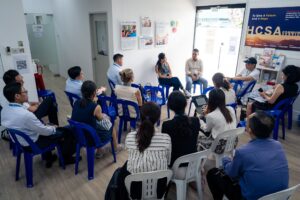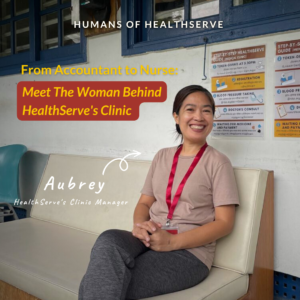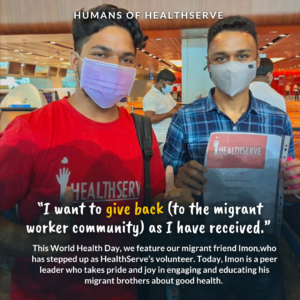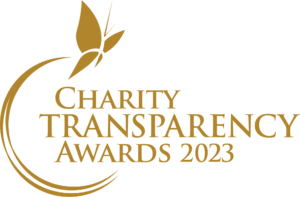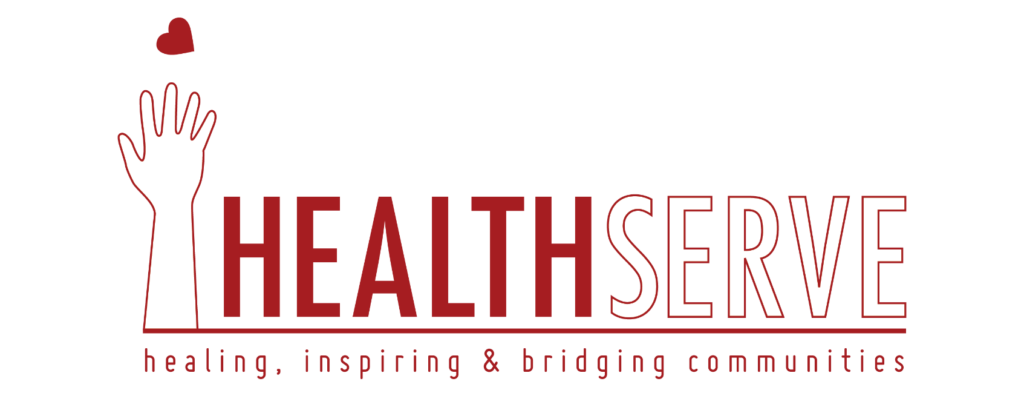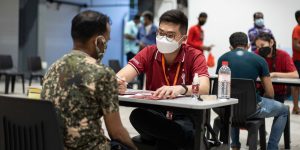21 June 2017, 10:40 a.m. Wang Zhi Guo, a Chinese construction worker, sits with an unusual stillness in the waiting area, staring up intently at the television screen above the doctors’ rooms. Although his medical appointment is scheduled at 11.45 am, he has been waiting in the hospital since 9 am. Patiently, he watches the cue numbers change on the screen.
For a man always brimming with energy, his current reticence is surprising. One can often catch him animatedly gesturing during an engaging card game round during Happy Hour at HealthServe, or having a particularly spirited discussion with the other migrant brothers. Today, however, in this hospital environment, he grows muted and quiet.
“This medical assessment is very important to me,” he explains, when the two HealthServe interns accompanying him ask why he would come down more than two hours early for his appointment. “It makes the difference for me regarding the amount of compensation money I get for my injury.”
—
In March this same year, 38-year-old Zhi Guo was injured when a pipe dropped onto his right thumb during work, breaking the bone. However, the doctor at his company clinic only gave him 2 days of MC and 7 days of light duty, despite the fact that light duty would aggravate his injury. In fact, Zhi Guo was only able to find out how many days of MC and light duty he had when his friend helped to translate the doctor’s letter into Chinese for him.
When he went to another hospital to get a better medical assessment of his injury, the doctors immediately advised surgery for his thumb. Yet his boss kept trying to postpone his surgery, because his company did not want to pay for it. Instead, they continually sent him back to the negligent company doctor.
It was only a full month later that Zhi Guo finally managed to go for his surgery, and have a metal plate grafted onto his right thumb during the operation. At every step of the way, his boss hovered over all his medical decisions, and the hospital listened to his boss’ instructions instead of him. “The way they’ve been behaving this whole time, it’s almost as if my boss is the injured one, not me,” Zhi Guo shares, the frustration evident in his tone.
Now, his right thumb still bears the remnant red angry lines of the stitches from the operation, and remains completely stiff. He has lost most of the strength in his right thumb, and he can no longer use it to do simple activities like unlock a door or hold a bag of groceries. The injury is permanent – he repeatedly calls his right thumb “disabled”, “completely useless”, and worries about his ability to work in the future. While the compensation money for his right thumb would naturally be higher, given that it is critical to his functionality, his injury is for a lifetime.
—
12.35 p.m. Wang Zhi Guo grows visibly anxious as the time for his medical appointment passes but his number still hasn’t been called. He starts to fidget in his seat, and rap his fingers loudly on the seat beside him – a nervous antic that betrays his stress. Finally, his cue number appears on the screen. He leaps to his feet and powers on ahead to the doctor’s room he is assigned to, with the HealthServe interns following closely behind.
The doctor looks over his X-ray scans, takes down some brief notes from how Zhi Guo describes his injury, then calls another doctor over to give an opinion on his case. As the doctors talk over him in English, Zhi Guo’s eyes dart back and forth to each doctor as they take turns to speak. For once, he seems deflated and small in the corner of the room, an anxious and uncomprehending expression clearly on his face. The doctors only give him a simplified explanation in Chinese right at the end – but they kindly grant him 2 months of MC, which he desperately needs so that he can collect MC wages to support his family.
—
Before his injury, Zhi Guo used to support his elderly parents, his wife and his 15-year-old son, who live in the province of Hebei. His son’s education is part of the reason why Zhi Guo willingly endured such long working hours in Singapore – besides his desire to provide a good life for his family. This motivated him to work 7 days a week, and at least 10 hours a day, to earn as much as he can for them. When asked if he had any free days to rest, Zhi Guo laughs a little incredulously and shakes his head. “Rest? What rest?”
His family found out about his injury when the stream of money home trickled down to a bare minimum. Before, he used to earn more than $2,000 a month from working overtime. Now, he only earns about $1,000 in his MC wages. Beyond the tight finances, however, his family worries for his wellbeing. Zhi Guo himself misses them, having not seen them for an entire year. He stays in contact with them through WeChat, but naturally, nothing can trump being physically present at home to spend time with his loved ones.
—
1.15 p.m. Zhi Guo leaves the doctor’s room, carrying the doctor’s letter certifying that he has a metal plate grafted onto his right thumb, and a MC slip. He stops a nurse to ask her for some assistance, but she tells him that she is unable to speak Chinese, and walks away.
He goes to an empty corner and crouches on the floor. With a nervous energy, he quickly opens all his doctor’s letters and hands them to the HealthServe interns to translate for him, since he is unable to understand anything written on these letters. He worries that he will miss out something important, or that these doctors might follow the same trajectory as his company doctor, taking advantage of his inability to understand English and treating him unfairly.
At the counter, he approaches a nurse to ask for help, but she coldly dismisses his inquiry, not even bothering to look him in the eye when she tells him she doesn’t understand Chinese. She turns her head away to make a comment to her colleague instead. It is only when the HealthServe interns intervene, translating Zhi Guo’s inquiries into English, that she finally pays him due attention.
This is just a small taste, a microcosm of a larger system that often lapses into treating these migrant workers as invisible, and even as lesser patients. Language barriers make a migrant worker’s journey to recovery that much more difficult, and can even make these migrant workers vulnerable to exploitation.
—
Since coming to HealthServe, Zhi Guo has been leaning on the support of the Geylang Food Project for his daily meals, as well as the monthly MRT transportation fare that HealthServe provides. He has also joined many of the outings that HealthServe has organised for the Chinese migrant brothers, to places such as the SEA Aquarium in Sentosa and the newly refurbished National Art Gallery. “It’s expensive to go around in Singapore by yourself or with friends,” Zhi Guo says, and his mind is clearly focused on saving as much money as he can to provide for his family. “Without HealthServe, these are places I wouldn’t have had the opportunity to go to.”
More than that, HealthServe has been liaising with the Ministry of Manpower to report the negligence of Zhi Guo’s company doctor, who gave him only 2 days of MC for his injured thumb. Even as Zhi Guo awaits his compensation money, HealthServe seeks to raise the bar for the medical treatment of migrant workers by calling such doctors to account.
—
1.40 p.m. With the necessary paperwork finished, Zhi Guo is ready for his physiotherapy appointment at 2.20 pm. He turns around and waves goodbye to the HealthServe interns, who are heading back to the office.
“Thank you very much for coming with me to the hospital,” Zhi Guo says, beaming brightly. Some of his old spunk and vigour returns in his loud voice. “Next time I see you in the office, let me thank you by treating the both of you to a meal.”

